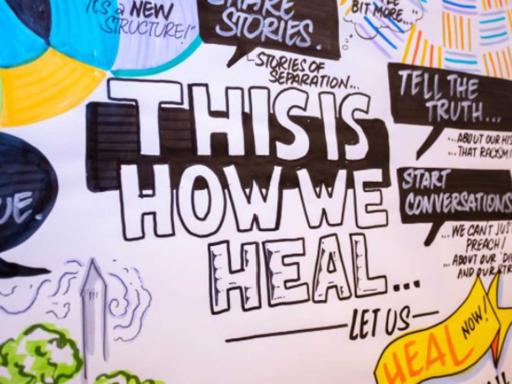As the Truth, Racial Healing & Transformation (TRHT) Michigan sites completed the fifth and final grant year, we’re taking an inside look at the processes and implementations of each Michigan TRHT site, lessons learned, how they supported communities, built relationships and how this work will continue. This week we are featuring Flint TRHT, hosted by the Community Foundation of Greater Flint.
CMF is the statewide convener supporting the four Michigan sites in Battle Creek, Flint, Lansing and Kalamazoo. The initiative is led by The W.K. Kellogg Foundation.
Over the last five years, the Flint site has deepened its community engagement efforts, progressed its policy change work and has adapted to the changing conditions of the pandemic in various ways.
The site has worked to deepen its engagement with the local Latino/a/x community through grantmaking for work by Latino/a/x-led organizations and Latino/a/x representation by racial healing staff and practitioners.
According to the TRHT Five Year Evaluation report, the COVID Racial Equity Task Force played a large role in building trust with the Latino/a/x community due to its strategic commitment to engage with local Black and Brown populations.
As CMF reported, the site developed the task force to raise awareness of disparate COVID-19 outcomes in the Flint community. The task force engaged community stakeholders across sectors to identify ways to provide equitable access to community services and resources.
As COVID-19 cases and the pace of testing and vaccination rates have shifted, the Flint site is transitioning the task force to a roundtable network focused on eliminating racial equity across a broader scope of issues that have a disparate impact on Black and Brown Communities.
The site has continued to grow its relationship with local government. According to the report, the site was asked to work directly with the City of Flint and Genesee County to influence the spending of American Rescue Plan Act (ARPA) dollars with a racial equity focus.
Lynn Williams, director of Community Engagement and Equity at CFGF, shared that the community foundation credits TRHT with providing the tools via racial healing circles, cross-sector convenings and open honest community conversations to forge trusting relationships with the city of Flint, residents and other community partners.
According to the report, Flint TRHT was instrumental in the conversations that led to the city of Flint’s commitment of funds to develop the St. John Street Memorial Park, a public gathering and memorial space that commemorates a historically Black neighborhood that was previously demolished to make way for a freeway.
The project worked to renovate and enhance the existing West Boulevard Park to include added recreational and community gathering spaces, historical signage, new benches and more.
Key Racial Healing Practitioners from Flint’s TRHT program, who worked with the City of Flint’s Choice Neighborhood in 2019, began conversations with the St. John Street Historical Committee, a group of local citizens interested in commemorating the St. John Neighborhood.
According to the report, these conversations led the mayor of the city of Flint to ask the committee to develop a plan for the memorial with the help of staff support from the city’s Department of Planning and Development.
Community members played a key role in the planning process by educating city staff, making recommendations and providing a bridge to other community members.
Some other key successes and partnerships of the site include:
- A collaboration with the Genesee County commissioners and departments to develop a resolution declaring racism as a public health crisis in the county.
- The site has built its racial healing capacity by training 21 new racial healing practitioners.
- The site was asked by Mott Community College to host a series of community conversations on the implications of the 1619 Project, an ongoing initiative from The New York Times that aims to reframe the country’s history by placing the consequences of slavery and the contributions of Black Americans at the very center of the national narrative.
- A partnership with Community Roots, a local community development group made up of longtime Flint residents, to develop a framework and tools to identify the most trusted community members who can share health and safety information with vulnerable and underserved community members.
While the five-year grant implementation of TRHT has ended, all sites will continue this work in various ways.
Flint TRHT’s work has intersected closely with the work of CFGF. The community foundation has committed to carrying out the site’s work through a racial equity lens going forward.
According to the report, this commitment is directly influencing the foundation’s strategic direction as well as its use of resources and investments. CFGF is continuing to amplify the resources offered by TRHT such as the training, speakers, racial healing circles and more.
Want more?
Learn more about TRHT Flint.
Learn more about TRHT.
